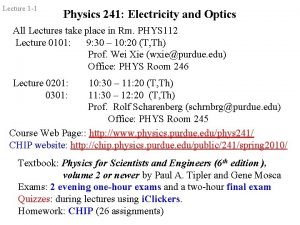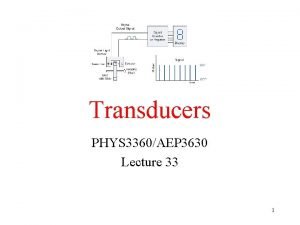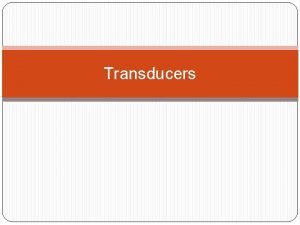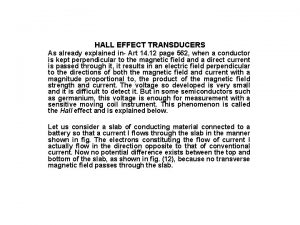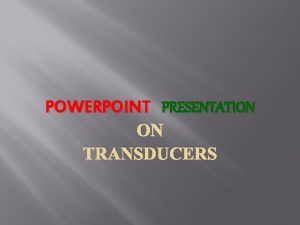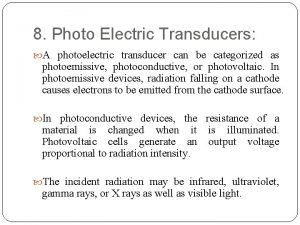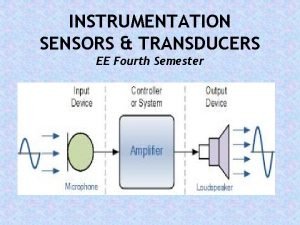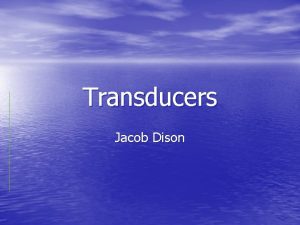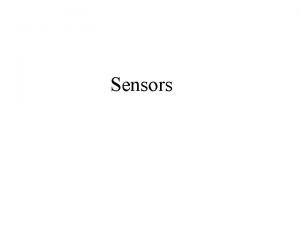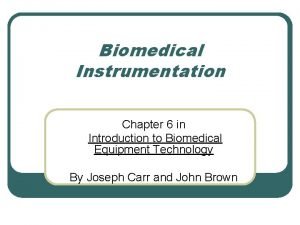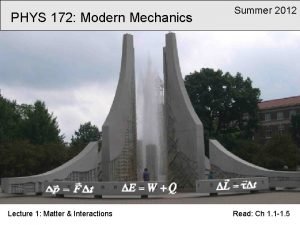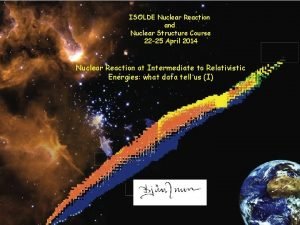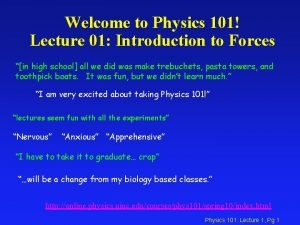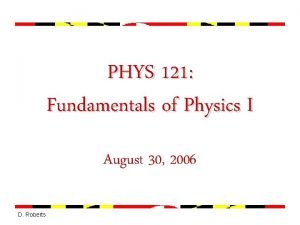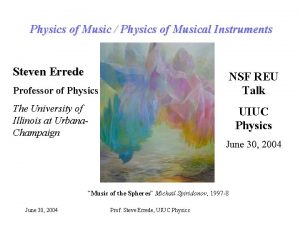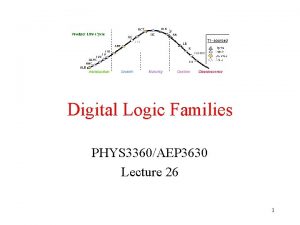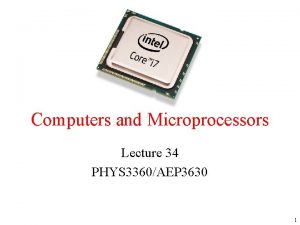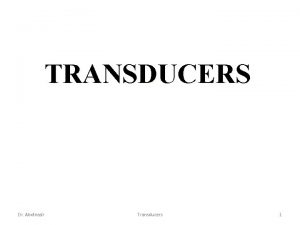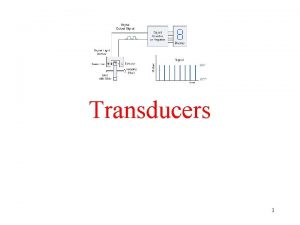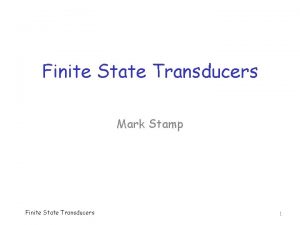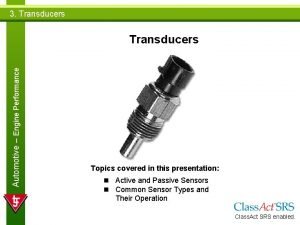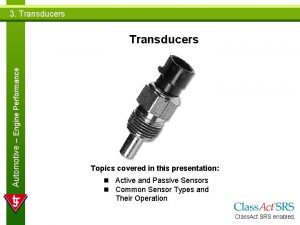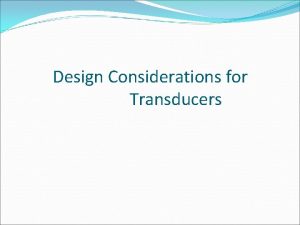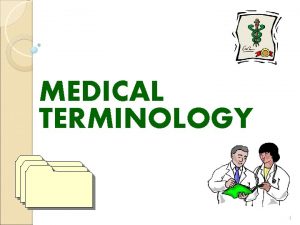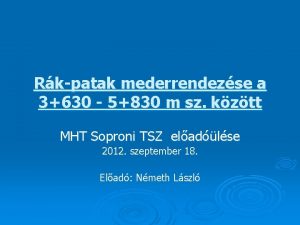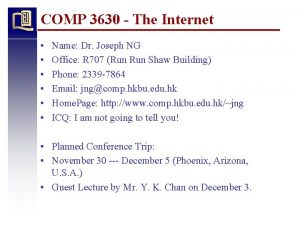Transducers PHYS 3360AEP 3630 Lecture 33 1 Terminology



















- Slides: 19

Transducers PHYS 3360/AEP 3630 Lecture 33 1

Terminology • Transducers convert one form of energy into another • Sensors/Actuators are input/output transducers • Sensors can be passive (e. g. change in resistance) or active (output is a voltage or current level) • Sensors can be analog (e. g. thermocouples) or digital (e. g. digital tachometer) Sensor Actuator 2

Transducer types Quantity being Measured Light Level Temperature Force/Pressure Position Speed Sound Input Device Output Device (Sensor) (Actuator) Light Dependant Resistor (LDR), Lights & Lamps, LED's & Photodiode, Phototransistor, Solar Cell Displays, Fiber Optics Thermocouple, Thermistor, Thermostat, Resistive temperature detectors (RTD) Heater, Fan, Peltier Elements Strain Gauge, Pressure Switch, Load Lifts & Jacks, Cells Electromagnetic, Vibration Potentiometer, Encoders, Motor, Solenoid, Panel Reflective/Slotted Opto-switch, LVDT Meters Tacho-generator, Reflective/Slotted AC and DC Motors, Opto-coupler, Doppler Effect Sensors Stepper Motor, Brake Carbon Microphone, Piezo-electric Bell, Buzzer, Loudspeaker Crystal 3

Positional Sensors: potentiometer Can be Linear or Rotational Processing circuit 4

Positional Sensors: LVDT Linear Variable Differential Transformer 5

Positional Sensors: Inductive Proximity Switch • Detects the presence of metallic objects (non-contact) via changing inductance • Sensor has 4 main parts: field producing Oscillator via a Coil; Detection Circuit which detects change in the field; and Output Circuit generating a signal (NO or NC) Used in traffic lights (inductive loop buried under the road). Sense objects in dirty environment. Does not work for non-metallic objects. Omni-directional. 6

Positional Sensors: Rotary Encoders • Incremental and absolute types • Incremental encoder needs a counter, loses absolute position between power glitches, must be re-homed • Absolute encoders common in CD/DVD drives 7

Temperature Sensors • Bimetallic switch (electro-mechanical) – used in thermostats. Can be “creep” or “snap” action. Creep-action: coil or spiral that unwinds or coils with changing temperature • Thermistors (thermally sensitive resistors); Platinum Resistance Thermometer (PRT), very high accuracy. 8

Thermocouples • Two dissimilar metals induce voltage difference (few m. V per 10 K) – electro-thermal or Seebeck effect • Use op-amp to process/amplify the voltage • Absolute accuracy of 1 K is difficult 9

10

Light sensors: photoconductive cells • Light dependent resistor (LDR) cell 11

Light level sensitive switch 12

Photojunction devices photodiode phototransistor 13

Photovoltaic Solar Cells • Can convert about 20% of light power into electricity • Voltage is low (diode drop, ~0. 6 V) Solar power is 1. 4 k. W/m^2 14

Photomultiplier tubes (PMT) • Most sensitive of light sensors (can detect individual photons) • Acts as a current source electrons 15

Motion sensors/transducers • Switches, solenoids, relays, motors, etc. • Motors • DC • Brushed/brushless Stepper motor • Servo • Stepper motors • AC Brushed motor – permanent magnets on armature, rotor acts as electromagnet Brushless motor – permanent magnet on the rotor, electromagnets on armature are switched 16

Sound transducers microphone speaker • Note: voice coil can also be used to generate fast motion 17

Piezo transducers • Detect motion (high and low frequency) • Sound (lab this week), pressure, fast motion • Cheap, reliable but has a very limited range of motion 18

Summary • We’ve only briefly touched on most basic types • Many other transducers are used/common, almost for any physical quantity one can think of • Processing electronics is often essential: output of many sensors is not linear, needs impedance transform, filtering, etc. • For additional references see • http: //www. electronics-tutorials. ws/io/io_1. html • Handbook of Transducers by H. N. Norton • http: //www. sparkfun. com 19
 Cs 3630
Cs 3630 Charging by induction
Charging by induction Transducer
Transducer Basic requirements of transducer
Basic requirements of transducer Hall effect transducers
Hall effect transducers Transducers ppt
Transducers ppt What is photoelectric transducer
What is photoelectric transducer Angular velocity transducer
Angular velocity transducer Transducers and sensors
Transducers and sensors Bidirectional transducers in automata theory
Bidirectional transducers in automata theory Advantage of lvdt
Advantage of lvdt Transducers used in biomedical instrumentation
Transducers used in biomedical instrumentation 01:640:244 lecture notes - lecture 15: plat, idah, farad
01:640:244 lecture notes - lecture 15: plat, idah, farad Phys 172
Phys 172 Isolde martinson
Isolde martinson Saturn facts
Saturn facts Physics 101 uiuc
Physics 101 uiuc Phys 121 umd
Phys 121 umd Phys 398 uiuc
Phys 398 uiuc Aljalal phys 102
Aljalal phys 102

